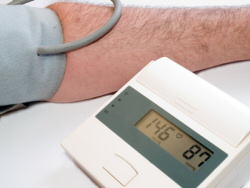High Cholesterol:
 Cholesterol is one of the body's normal building blocks, and is the "cement" lining the walls of normal cells. Of course, if it accumulates elsewhere in the body such as blood vessels, it can cause problems. The total cholesterol reflects both the ingested amount and the amount being made in the liver. Thus despite eating healthily with a low cholesterol diet, a raised cholesterol is likely to reflect what is being made in the liver. In such cases, medication is usually necessary to lower it. Cholesterol is one of the body's normal building blocks, and is the "cement" lining the walls of normal cells. Of course, if it accumulates elsewhere in the body such as blood vessels, it can cause problems. The total cholesterol reflects both the ingested amount and the amount being made in the liver. Thus despite eating healthily with a low cholesterol diet, a raised cholesterol is likely to reflect what is being made in the liver. In such cases, medication is usually necessary to lower it.
The total cholesterol value is measured as the sum of both good cholesterol (HDL, or high density lipoprotein), and bad cholesterol (LDL, or low density lipoprotein). The good cholesterol is so called as it helps mop up the bad LDL. Thus we need to ensure that HDL is maintained high enough (more than 1.2mmol/l) to achieve this. This is sometimes overlooked in clinical practice where more attention is focused on LDL. One should be reminded that a low HDL is ranked the fourth highest independent risk factor for coronary disease.
Treatment for a low HDL includes exercise, weight reduction, red wine! and sometimes medication. For raised LDL, dietary modification with a low cholesterol diet should precede any medication. Statins are the commonest group of tablets to be prescribed. Occasionally statins are not tolerated due to side-effects, but alternatives exist.
Triglycerides are another group of chemicals that can accumulate in blood vessels and also cause damage. They are considered the 10th highest independent risk factor for developing coronary disease. Elevation can be secondary to alcohol excess, diabetes or low thyroid activity. If not, it can be uncommonly a genetic problem, and require specific medication.
After any dietary or medical intervention, one should allow three months before rechecking that lower levels have been achieved.
With significantly raised total cholesterol, say above 7.0mmol/l, an inherited form of raised cholesterol should be considered (Familial Hyperlipidaemia). In most cases of cholesterol elevation of this level require medication. More importantly family screening of all blood relatives is essential for a possible inherited condition. It would be just as important to treat family members too.
The ideal cholesterol profile includes total cholesterol less than 4 mmol/l, and LDL 2 mmol/l, and an HDL more than 1.5 mmol/l.
|